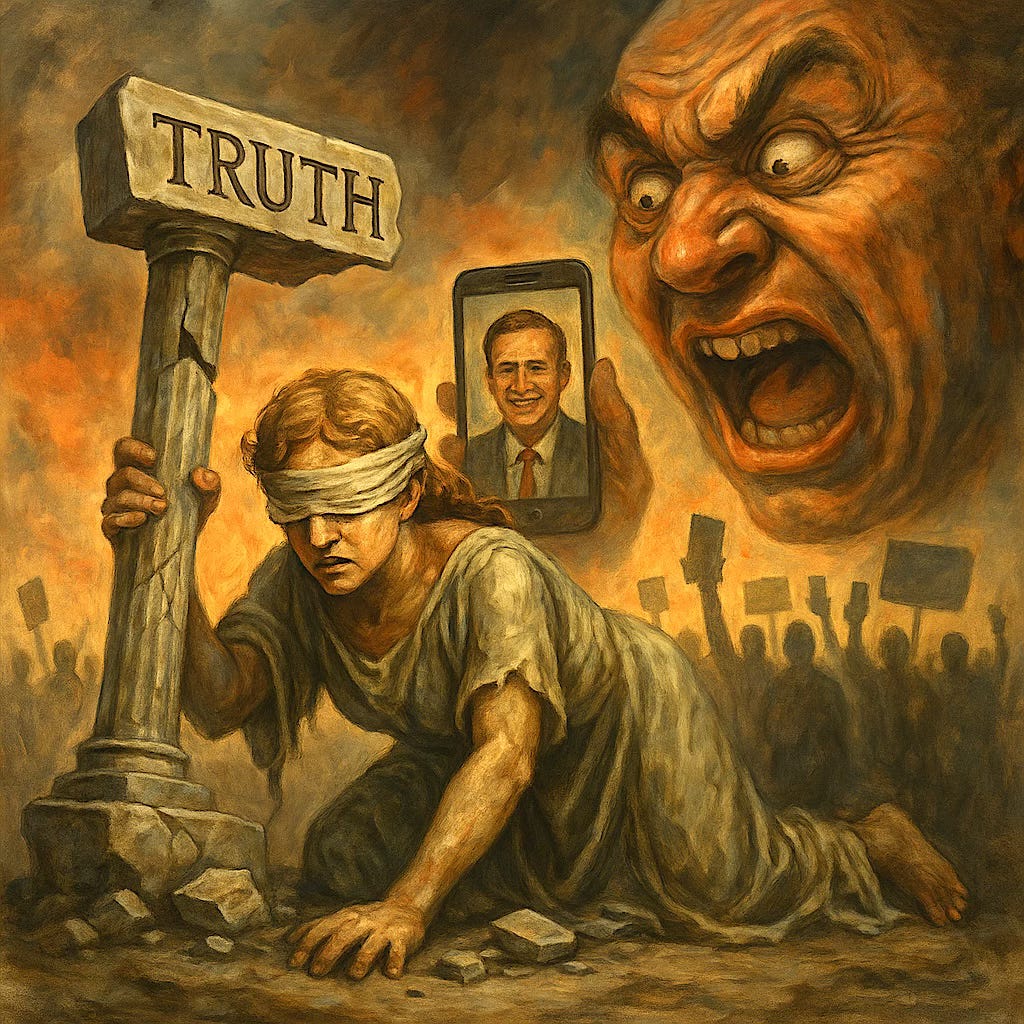Once upon a time, truth was a sturdy beast. The kind of thing you could lean on after three martinis and a bad night’s sleep. Then came the internet, and now the beast is loose in the casino, chain-smoking menthols, betting your rent money, and mumbling about “vibes-based epistemology.”
Reality used to be simple. If you saw it, heard it, touched it—case closed. Your grandmother said it, your teacher signed off, Walter Cronkite looked into the camera and told you everything was basically fine except for the nuclear war part. The only “deepfake” back then was your uncle’s comb-over. Sure, people lied, but at least their lies had style.
Now? Forget it. The internet—once pitched as a global library—turned into a warehouse fire of clickbait, cat videos, and conspiracy theorists live-streaming their own dental work. Truth is not just negotiable. It’s a time-share you bought during a blackout in Cancún and now there’s a new bill every month. Information multiplies like rabbits on Viagra. Meanwhile, you’re left fact-checking whether your cousin was abducted by lizard people or just bad at parking.
Remember when Sonny Rollins said, “A lie gets halfway around the world before the truth can tie its shoes”? These days, the lie is already starting an MLM, launching a podcast, and DMing your ex before the truth even wakes up and finds its phone.
Enter AI, riding a unicycle and juggling flaming chainsaws. Want to hear the President admit to worshipping Cthulhu on national TV? There’s an app for that. Want a photo of your neighbor breakdancing with the Pope? Easy. With a $300 laptop and a grudge, anyone can manufacture evidence to destroy reputations, marriages, or the fragile concept of reality itself.
Fact is, “proof” now comes with an asterisk the size of Greenland. Every video, every photo, every voicemail could be fake. Your wedding video? Sorry, deepfake—your real spouse is still in customs.
So what do we do? Some retreat into tribes, clutching their “personal truths” like limited-edition Beanie Babies. Others spiral into radical uncertainty, doubting whether their breakfast existed or if it was generated by a neural net with a gluten intolerance.
This isn’t skepticism. This is epistemic nihilism with a Wi-Fi connection. You want to know what’s real? Good luck. Truth is now a Yelp review written by a bot that’s never tasted food. Society’s “shared reality” is splintered into a billion TikTok feeds, each algorithmically optimized for outrage, dopamine, and suspicious hair supplements.
Sure, people say, “This is nothing new. Propaganda, fake news, yellow journalism—same as it ever was.” Wrong. This isn’t the same con game with better graphics. This is Las Vegas in the Matrix, and the house never loses.
So where do we go from here? Maybe the end of truth is a new beginning—a reality where everyone’s in on the joke, and skepticism is the new literacy. Maybe we crowdsource reality, rate it, and update it daily like Wikipedia after a bender. Maybe the only thing left is human connection—your friends, your dog, your favorite taco stand in Guanajuato—assuming none of them are deepfakes.
Or maybe we stop pretending there ever was a golden age of Truth and admit we’ve always been winging it. If so, the only way to survive is to laugh, double-check your sources, and never, ever trust a guy who says “I did my own research.”
Welcome to the end of truth. Please enjoy your stay. No refunds.



Yup, doing our own research is the only the best option, but since most of it is done .online, it's just a matter of time before the tech bros are cajoled into modulating politica content completely, maybe even rewriting evolution, que no?
“Every video, every photo, every voicemail could be fake…” Let’s develop a “truth app.” Snopes on steroids. I wish I could say this isn’t brilliant and spot on…truth is, it’s where we are today. You nailed it again.